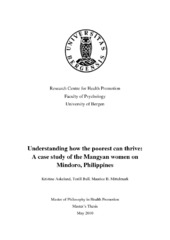Understanding how the poorest can thrive: A case study of the Mangyan women on Mindoro, Philippines
Master thesis
Permanent lenke
https://hdl.handle.net/1956/4277Utgivelsesdato
2010-05-18Metadata
Vis full innførselSamlinger
Sammendrag
This masters' thesis is within the field of Social Determinants of Health in very poor rural areas. Within this field, the focus is on the topic of social determinants of social position and health. The purpose of this study is to understand the perceived determinants of social position and physical and mental health amongst Mangyan women of childbearing age in the north of Mindoro, the Philippines. The study applied case study design using in-depth interviews with nine key informants with relevant experience working with the Mangyan women. The literature indicates that there is a relation between social position and health. Further, there is acknowledgement that the measurements used may not be appropriate for poor people. Moreover, the literature indicates that research done on poor women have a focus on reproduction health and not the overall health of the women. This is an exploratory study within a field that is not done much research in before. The Mangyans are an indigenous people living on the island of Mindoro, the Philippines. When looking at social position within a small Mangyan community, social position and status, education and religious beliefs were some of the themes that emerged. Further, the paradox between developing towards what the world sees as important and how that conflicts their traditional culture emerged.
Utgiver
The University of BergenOpphavsrett
Copyright the author. All rights reservedThe author
